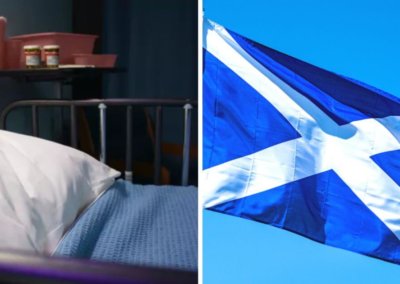The Liberal Democrats have pledged to introduce an extreme abortion law to the United Kingdom in their manifesto, released this afternoon.
The manifesto outlines that the party will ‘decriminalise’ abortion through to 24 weeks right across the UK. Along with a commitment to “fund abortion clinics to provide their services free of charge to service users regardless of nationality or residency” they have pledged to introduce ‘censorship zones’ around abortion clinics to make it a crime to offer support to women outside abortion clinics.
The party have also committed to “working to extend reproductive rights” overseas. This will likely involve increasing the already large amount of tax-payer funding the Conservative Government have committed to spending on providing abortions in developing countries.
If these proposals were to go ahead, it would leave the UK with the most extreme abortion regime in Europe and one of the most extreme abortions regimes in the world.
Abortion in England, Wales and Scotland is currently legal under the criteria set out in the 1967 Abortion Act. In 2018, 200,608 abortions took place in England and Wales on local residents, this being the highest figure ever – and the release of the manifesto pledge comes after the recent news that five teenagers had at least their sixth abortion in 2018.
The term ‘decriminalise’ is a misnomer used by abortion campaigners to describe the removal of almost all current safeguards around abortion.
The campaign to ‘decriminalise’ abortion has been led by Diana Johnson MP who has made it clear that she is seeking to repeal sections 58 and 59 of the Offences Against the Persons Act in England and Wales.
Repealing these provisions would introduce abortion on demand, for any reason, up until when a child is capable of being born alive, with a ceiling of 28 weeks, to England and Wales, removing almost all the legal safeguards around abortion provided by the Abortion Act (see briefing here for further details on the implications of this change in law).
Repealing sections 58 and 59 would leave England and Wales with one of the most extreme abortion laws in the world. The change would position England and Wales drastically away from the rest of Europe, where the most common abortion time limit among EU countries is 12 weeks.
Even if the Liberal Democrats retained ‘the existing 24-week limit’ almost all existing legal safeguards around abortion would be removed prior to 24 weeks. This removal of these legal safeguards would result in the following extreme changes to abortion law in the UK:
- Abortions could be performed almost anywhere including schools and mobile abortion clinics – The Abortion Act (1967) currently restricts abortion to hospitals or places approved by the Secretary of State. This means that abortions are available in a limited number of locations. Without this legal safeguard, there would be no legislation governing where an abortion can be performed. In practice, it would be possible that:
- Manual vacuum aspiration abortions could be performed in school nurse clinics or abortion pills handed out by school nurses to pregnant girls.
- Abortions could be available in literally thousands of locations in communities across the UK including sexual health clinics, all GP surgeries, school nurse clinics, pharmacies, university health clinics etc. This could also include abortions being available in mobile abortion clinics.
- There will likely be a large increase in the ordering of abortion pills from unsafe online abortion providers. With the removal of legislation making it specifically illegal to use these pills, there will be less incentive to not order abortion pills online.
- There will be no requirement that a doctor must be involved – the Abortion Act 1967 requires the approval of two doctors before an abortion can be performed. Even with this legal restriction in place, there are still many cases of complications during abortions in the UK, resulting in babies being born alive, women’s uteruses being perforated or severe haemorrhaging that has resulted in death.
- However, without the current safeguards provided by the Abortion Act, it would be possible that healthcare assistants, nurses and pharmacists will be able to take the leading role in the abortion process.
- There would also be no specific abortion legislation stopping other third parties from either providing abortion pills or undertaking a ‘back-street abortion’ on women.
- In 2013, Maria Caulfield MP described a similar failed attempt to remove doctors from the abortion process as “a charter for unsafe abortion practices, not dissimilar to the back-street abortions that the Abortion Act 1967 was supposedly meant to end.”
- It would be more difficult to prosecute men who slip abortion pills into a woman’s food – In cases where, for example, a woman’s partner puts abortion pills in her food or drink without her knowledge, he can currently be prosecuted under sections 58 and 59 of the Offences Against the Person Act (OAPA).
- It is precisely these sections of the OAPA that campaigners are proposing to repeal. In which case, it will become more difficult to prosecute someone who engages in a non-consensual abortion of this kind.
- For example, in 2008, a man was convicted under s. 58 of OAPA for putting abortion pills in his wife’s sandwich. Without sections 58 and 59 of OAPA, such prosecutions would be very difficult, if not impossible, to bring.
- Even if they could be prosecuted under the poisoning offences (sections 23 and 24 of the OAPA) the maximum sentence, 5 years, would be lower than what is available under sections 58 and 59.
- In any event, such alternative prosecutions fail to take into account that there are two victims of the poisoning/non-consensual abortion: the woman and her child.
Last week, the Liberal Democrats deselected MP candidate Rob Flello over his wrong ‘values’ just 36 hours after his candidacy was announced.
The former Labour MP, who represented the people of Stoke-on-Tren South for 12 years, had voted in favour of giving women considering abortion a legal right to independent counselling and supported an amendment to ban sex-selective abortion.
Polling from Savant ComRes shows that the vast majority of women agree with Mr Flello on his positions on abortion and that these are not fringe positions to take. The polling also showed similarly strong support for these positions from Liberal Democrat voters.
In 1992, Lord David Alton announced that he would not stand again as a Liberal Democrat candidate following the party’s decision to make abortion a policy issue rather than a matter of conscience.
Lord Alton, who has spent over 40 years tirelessly championing the pro-life cause in parliament, was the youngest Member of Parliament, aged 28, when he was elected for the Liberal Party in 1979.
The release of the manifesto has come as Right To Life UK has launched a major general election campaign – the Vote For Both Lives campaign – a large-scale initiative that they will run throughout the country in the lead up to election day on 12th December.
MP candidates are being asked to sign the Both Lives Pledge, which outlines three policy changes that are designed to increase protection for babies in the womb and end pregnancy discrimination for women – policies that will save lives by protecting and supporting both mother and child. These policies are likely to be brought forward by politicians in the next parliament.
Independent polling by Savanta ComRes shows that all three policy changes are strongly supported by the public.
Constituents are being encouraged to visit www.righttolife.org.uk/bothlives where it takes 30 seconds to ask their candidates to sign the Both Lives Pledge.
A spokesperson for Right To Life UK, Catherine Robinson said:
“Is the record number of 200,608 abortions for English and Welsh residents in 2018 not enough for the Liberal Democrats? Is 1 in 4 babies being aborted not enough for the Liberal Democrats? Is the recent news that five teenagers had at least their sixth abortion in 2018 not enough for the Liberal Democrats? Clearly not.
The proposed law change would leave us with one of the most extreme abortion laws in the world and further position England and Wales drastically away from Europe where the most common abortion time limit among EU countries is 12 weeks.
Polling shows large majorities of women in the UK support changes to our abortion laws that would have a positive impact on lowering the number of abortions. 70% of women want the current time limit on abortion to be lowered and 91% of women want a ban on sex-selective abortion.
The Liberal Democrats should be committing to bringing forward sensible new restrictions and increased support for women with unplanned pregnancies. This would ensure we were working together as a society to reduce the tragic number of abortions that happen each year.
The Liberal Democrats’ manifesto confirms that the abortion lobby will be back in full force in the next parliament, pushing to introduce new extreme legislation.
That is why we are urging everyone who is against sex-selective abortion and pregnancy discrimination, and who want to see our abortion time limits lowered to ask their MP candidates to sign our Both Lives Pledge, so we can inform the public on where their candidates stand on these important pro-life issues.”












